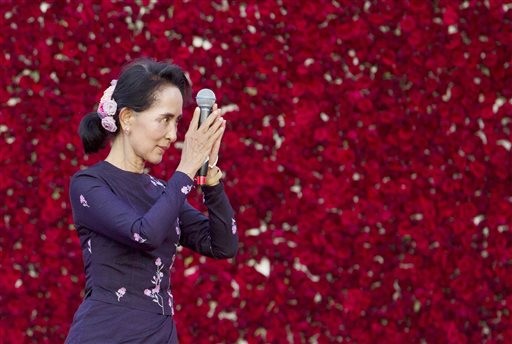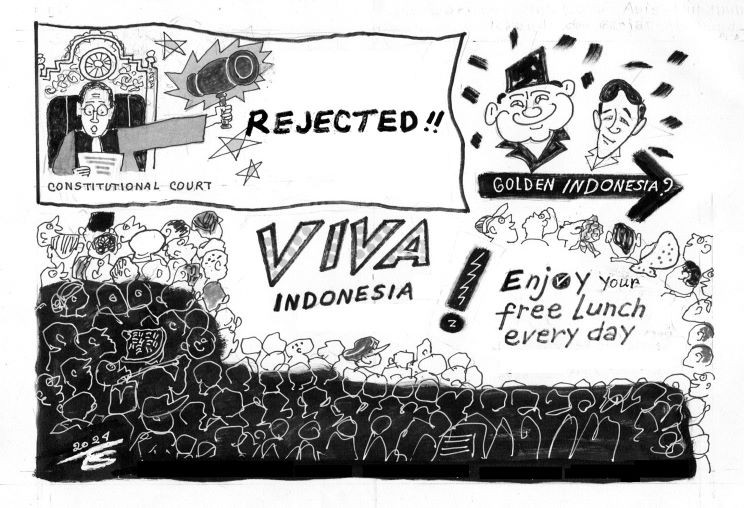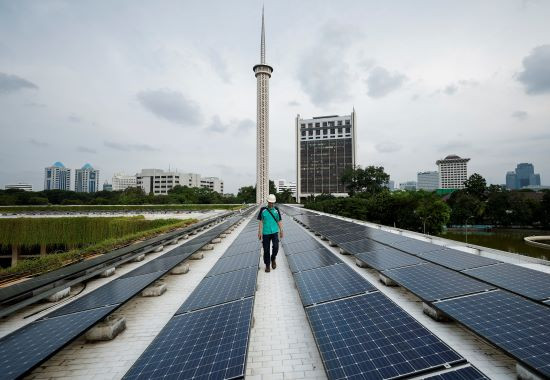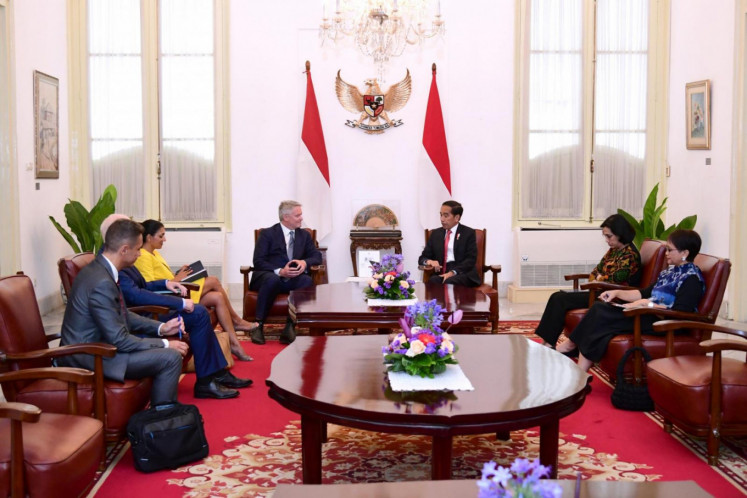Myanmar's missteps or new directions?
The international community roared approval when the National League for Democracy (NLD) and its iconic leader, Aung San Suu Kyi swept to power at the 2015 elections. Now, some 100 days after taking power, many foreign pundits are becoming more critical.
The lady was expected to be a beacon for human rights in the region and for progress on the issue of Muslims in Rakhine state. Foreign investors hoped that the NLD government would continue and indeed speed up the opening of this frontier economy started by the preceding administration.
Change Size
 Myanmar opposition leader Aung San Suu Kyi greets supporters before delivering a speech during a campaign rally of her National League for Democracy party in Yangon, Myanmar, Nov. 1, 2015. (AP/Gemunu Amarasinghe)
Myanmar opposition leader Aung San Suu Kyi greets supporters before delivering a speech during a campaign rally of her National League for Democracy party in Yangon, Myanmar, Nov. 1, 2015. (AP/Gemunu Amarasinghe)
T
he international community roared approval when the National League for Democracy (NLD) and its iconic leader, Aung San Suu Kyi swept to power at the 2015 elections. Now, some 100 days after taking power, many foreign pundits are becoming more critical.
The lady was expected to be a beacon for human rights in the region and for progress on the issue of Muslims in Rakhine state. Foreign investors hoped that the NLD government would continue and indeed speed up the opening of this frontier economy started by the preceding administration.
Neither seems to be showing progress. From the outside, some perceive underperformance and uncertainty in the new government. However, a closer look reveals not inaction but a mismatch between external expectations and the new government’s priorities.
As the NLD leader and with her personal authority, Aung San Suu Kyi has consolidated her position at the center of decision-making. While there are questions of capacity in the government, she has set her priorities quite clearly.
Top of the political agenda, the Lady is focusing on the issue of ethnic armed groups and national reconciliation. This effort is herculean, given that the fighting in a number of areas has taken place over decades and several groups are well armed, with control over the border areas. To get all the groups to stop fighting is a necessary first step towards stable development.
The government’s effort is showing signs they might get further. In late August, Aung San Suu Kyi will convene the 21st Century Panglong Conference that if successful, will be an important step towards peace and stability in Myanmar.
This upcoming Conference draws its prestige by association to the first Panglong Conference held in 1947 by her father, General Aung San and other ethnic leaders. In keeping with the original spirit of inclusiveness, the government, for the first time, is working to involve even non-signatories to the Nationwide Ceasefire Agreement to create the framework for the conference.
The economic agenda is receiving considerably less attention. However even prior to the election, senior NLD members conveyed to the Singapore Institute of International Affairs that they had no intention to reverse the economic opening that had begun under Thein Sein’s administration.
We believe that this intention remains despite the fact that some projects that were approved by the preceding government have been put on hold. One notable example is the stoppage of all building projects above nine stories in Yangon to re-assess if they complied with city’s development plans.
While the delays raise alarm bells, this does not signify a change in opening and can be seen as an effort to strengthen rule of law and prevent corruption.
Looking ahead, such efforts can lead to a more efficient and rational system in the country and some early signs are already evident.
The Myanmar Investment Commission, which is responsible for approving foreign investment projects, have started to roll out the first batch of approvals for new foreign investments. A draft of the new Investment Law to reduce restrictions for foreign investments has also been submitted to Parliament for debate, and the government has recently formed an Economic Committee to review trade, monetary, fiscal and investment policies.
An initial outline of economic policies can be expected in the coming weeks. But what is already emerging is a focus on new priorities. One of which is to create jobs for Myanmar people.
Rather than looking only at the total sum of foreign investment, the government is giving new emphasis on the number of jobs created for Myanmar workers.
In tandem, the government is pushing for workers to undergo skills training to take up those jobs. Training is being requested from both private sector and from friendly governments.
In this context, Singapore’s premier Lee Hsien Loong stated on his recent visit to Myanmar that Singapore would continue to support Myanmar’s development through the Singapore-Myanmar Vocational Training Institute in Yangon.
The emphasis on jobs and training is not necessarily an obstacle to the projects agreed under the previous government.
The Thilawa Special Economic Zone, for example, is proceeding and continuing to show positive signs, according to both government officials and foreign investors.
Looking ahead, plans for export zones and industrial areas in and around Yangon — where much of the population resides and seek jobs — will likely be another priority. There are plans for a 700-acre economic zone in northern Yangon, and infrastructure projects such as roads and energy plants are also expected to get a boost in the coming months.
There is a considerable transition from being an outspoken Opposition to the actual responsibilities of governing. There will be questions about the capacity and experience of the new policymakers as well as whether old bureaucrats will take the lead from the new leadership.
After many decades under a succession of military and military-backed governments, a change in mindsets needs time and new thinking. The balance between the two elements of change and maintaining of old values needs to be negotiated in the months ahead. Given its sweeping election win, the NLD believes it has more time and, moreover, the mandate to focus on what it considers essential.
This week Myanmar marks its 69th Martyrs’ Day to commemorate the assassination of General Aung San, who is not just the Lady’s father but also widely regarded as the Father of the Nation.
Even six decades on, the Martyrs continue to capture the imagination with a vision of a unified and prosperous Myanmar.
This year will be the first Martyrs’ Day with the NLD in power, and more than ever the spotlight is on Daw Aung San Suu Kyi. Perhaps Martyrs’ Day, more than the 100 day marker, is more appropriate in setting the tone for what the Myanmar people expect of their new government in moving ahead, no matter what the sacrifice.
***
Simon Tay and Melody Au are respectively chairman and senior policy research analyst at the Singapore Institute of International Affairs.
---------------
We are looking for information, opinions, and in-depth analysis from experts or scholars in a variety of fields. We choose articles based on facts or opinions about general news, as well as quality analysis and commentary about Indonesia or international events. Send your piece to community@jakpost.com.









